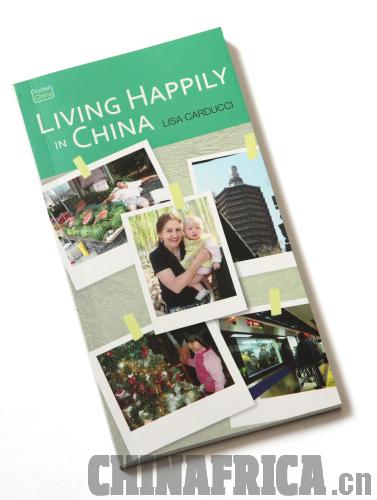| 
Lisa Carducci is a veteran author who has spent some 20 years in China. In Living Happily in China, the Canadian writer touches on a core issue for most Western expats on the mainland: How to live meaningfully in the Middle Kingdom? Her "secrets" are based on first-hand experience. "I feel perfectly integrated and adapted here," she says. "There is no reason for other expats not to be able to. It's my pleasure, and an honor, to guide them."
After her first visit in 1985, Carducci decided to settle in China and take time to discover, in her words, "this culture, so different from our Western cultures." In the book she recalls that while teaching at a university in Beijing, she had, in her room, an uncomfortable chair. To replace it, she took one of the dusty chairs stacked outside the cafeteria that seemed useless. An employee told her through gestures that she couldn't do that. To her question, "Who made this rule?" the man answered, "You guiding." Frustrated, she asked to be shown to Mr. You's office, believing, as most of foreigners do, that approaching the official directly would carry quicker results than climbing the ladder of hierarchy. She later learned that "you guiding" was not a person's name but meant "This is the rule."
"Each of my mistakes taught me something," writes Carducci. Other expats soon began asking her to be their mediator when they needed something. This was because, she explains, "on the one hand, I had carefully observed the Chinese and detected the protocol to be listened to; on the other hand, I didn't automatically put the blame on the Chinese in case of a conflict."
For instance, a young French woman who had just arrived in China thought she was unfairly treated when there was no mosquito-killer in her room. She told Carducci that she had demanded one, and "they dared ask for money." Carducci told her that, first of all, one must not "demand" anything in the host country. After some inquiring, Carducci realized that someone had already been sent to buy new mosquito-killer for the woman.
Through the years, Carducci has set foot at least once in each of China's 34 provinces, autonomous regions, municipalities and special administrative regions. She has stayed – sometimes for weeks – with different ethnic minorities like the Miao, Tibetans and the Hui, sharing their diet, cultural and religious customs, and taking part in household and farming chores, but mostly keeping her eyes open on any manifestation of "differences."
Readers may marvel at her sharp observations about Chinese social etiquette. For example, when and where to sit around a dinner table to show respect to the host and other guests? Should one drink wine alone to quench thirst? When should one stop eating? And most crucially, how to protect yourself when invited to gan bei with bai jiu at banquets? Carducci explains the composition of a menu including the five flavors, a cultural aspect that few Chinese under 40 know about.
Reading this small book is enjoyable, as Carducci always laughs at her own mistakes with good humor. For instance, she was thrown out (she thought) of a food store for demanding mi fan (cooked rice) while she wanted to buy da mi (raw rice). "It is our reaction to give the monopoly of error to the Chinese when they do things which are contrary to our habits," she writes. "But most of the time, we are those who have not understood."
"If we are not ready to absorb a new culture, the cause of our failure must not be sought for elsewhere," states the author of 65 published books, of which around 40 talk about China. "Integration doesn't mean to reject all that is Western and treasure all that is Chinese. It means to observe, reflect, and adapt, to make our own place in society and feel at ease in it."
Living Happily in China, a pocket book that offers readers answers to a diversity of situations, may be found, in Beijing, at the Sanlitun Bookworm, Wangfujing Foreign Languages Bookstore, the Books Building of Xidan Street, and at the Capital Airport's shops, or by e-mailing the author: carducci_lisa@yahoo.fr. |